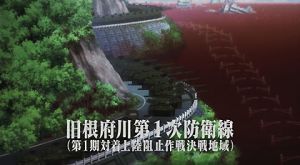Resources:Explanation of Evangelion 1.01
Explanation of Evangelion 1.01 is a feature included on the second disc of the "special edition" 1.01 DVD release of Evangelion 1.0: You Are (Not) Alone. This is identical to the regular movie, save for the inclusion of large captions displayed throughout the film which provide the "official designations" of people, locations, weapons, technology, and so forth. This was probably done in homage to Episode 06 of the original series, from which the final act of the film is adapted.
Translation & Notes: Reichu
Credits
General Director: Hideaki Anno (庵野秀明)
Caption Digital Work: Tomoko Masuda (増田朋子)
Editor: Hiroshi Okuda (奥田浩史)
Translation Support: Dan Kanemitsu (兼光ダニエル真)
Creative Producer: Manabu Ishikawa (石川学)
Digital Production: Yosuke Kagami (鏡洋祐), Takashi Mori (森貴之)
General Notes
- A decent number of the terms are rendered in English within the film itself and the companion book Evangelion 1.0 Complete Records Collection, and these have been utilized heavily (albeit not with perfect consistency) in my translation. When there is a “significant” difference between these English renditions and what the Japanese literally says, I provide a literal translation as a footnote for your amusement.
- I use “ibid” (short for ibidum) in the literal Latin sense, i.e., “in the aforementioned place”. The original Japanese is 同 (dou, “the same”), used here to avoid repetition in many of the back-to-back entries regarding locations, although this does mean you have to deduce how much of the aforementioned place is actually the “same”. Hopefully shouldn't be a problem, though.
- Since many Japanese proper names have kanji that can be read multiple ways, I attempted, to the best of my ability, to find out the correct pronunciations of the specific places mentioned. I will note when I was unable to do so.
- On a related note, "Tomoko Masuda", "Yosuke Kagami", and "Takashi Mori" may be incorrect; I couldn't Google up confirmation for the pronunciations.
- Place names are left intact aside from translating 旧 (kyuu) into “Old” and 新 (shin) into “New”. FYI: -ko is “lake”, -yama or -zan is “mountain”, -take is “pass”, and -dani is “valley”.

